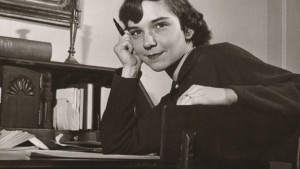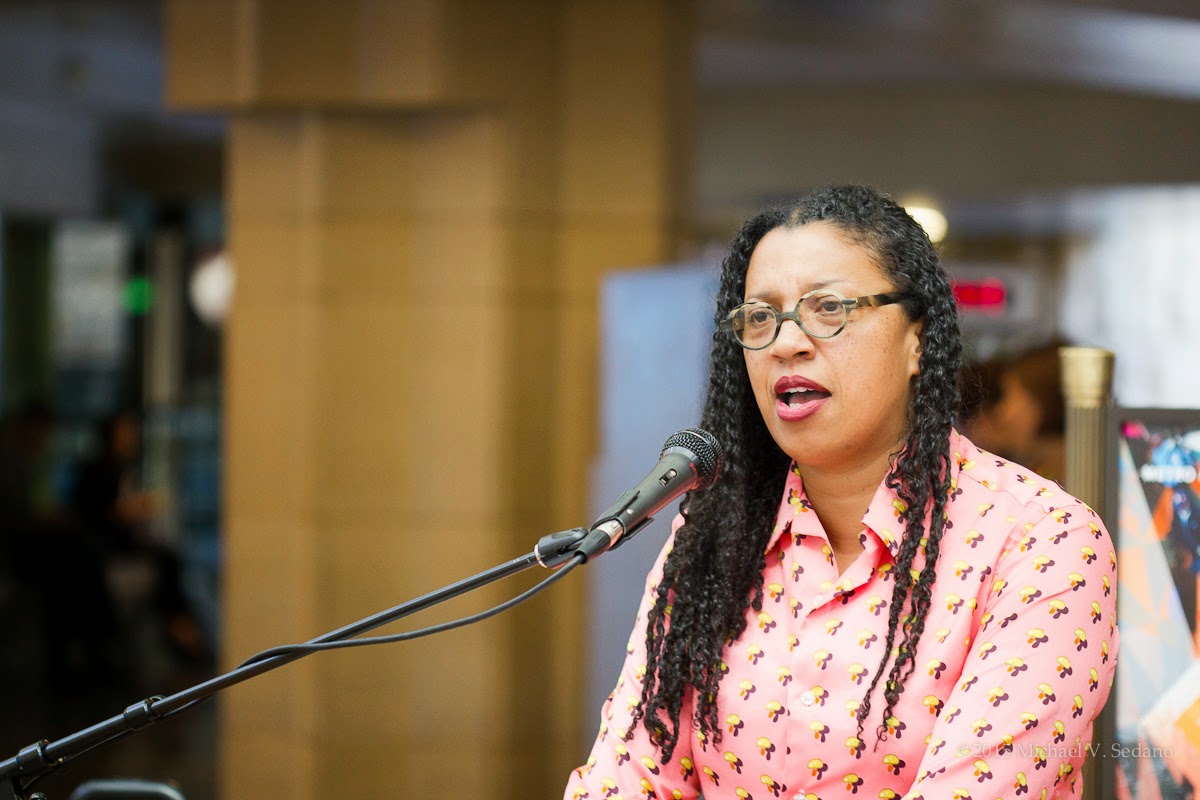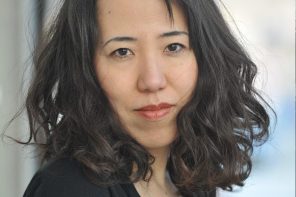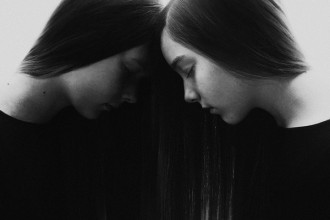
Arthur Rimbaud, en su Carta del vidente a Paul Demeny, escribió: “Cuando se rompa la infinita servidumbre de la mujer, cuando viva por ella y para ella, cuando el hombre -hasta ahora abominable- le haya dado la remisión, ¡también ella será poeta! ¡La mujer hará sus hallazgos en lo desconocido! ¿Serán sus mundos de ideas distintos de los nuestros? Descubrirá cosas extrañas, insondables, repulsivas, deliciosas; nosotros las recogeremos, las comprenderemos”. Era el año 1871 y por entonces Emily Dickinson continuaba escribiendo, en casi total secreto, poemas que no pertenecían a su siglo, precursores de esos vértigos que el francés trataba de vislumbrar.
Surgían así, con ella y con Walt Whitman, los primeros trazos del asombroso mapa de una nueva poesía: la norteamericana, una historia en la que las mujeres tendrán un papel imprescindible desde su mismo inicio.
Una amiga me preguntó hace años, cuando empezaba a trabajar en la versión al español de Sea Change (Rompiente, se llamaría mucho después) de Jorie Graham: ¿por qué otra vez una mujer, una americana? No supe qué contestar. Ahora diría tal vez que es mi manera de recoger, de comprender esa experiencia otra, un doble mundo nuevo, el de las mujeres y el de la poesía estadounidense, tan diferente de la tradición europea. He intentado compartir mi fascinación por esa doble otredad, mediante el que para mí es un acto incomparablemente profundo de lectura, de comunicación: la traducción poética.
He escogido seis poemas de seis autoras, de estilos y asuntos muy distintos, con la idea de mostrar los múltiples senderos de esa alteridad: la originalidad cognitiva desligada de toda tradición reconocible y la búsqueda de lo sublime en Emily Dickinson; la reescritura vital y órfica de los antiguos mitos en Hilda Doolittle; el simbolismo urbano, irónico y desencantado, de Elizabeth Bishop; la expresión furiosa y electrizante del deseo femenino, con Anne Sexton; la reivindicación explícitamente feminista de Adrienne Rich; y la indagación sin barreras entre lo intelectual, lo emocional y lo físico de Jorie Graham. Espero que las versiones permitan intuir la soberbia complejidad de estos universos poéticos, que tanto han marcado mi propia manera de estar en el lenguaje.
Traducción e introducción a cargo de Rubén Martín, autor del poemario Radiografía del temblor (Renacimiento, 2007) y traductor de Poemas a la muerte de Emily Dickinson (2010) y Rompiente de Jorie Graham (2014), ambos en Bartleby Editores. Actualmente trabaja en su segundo libro de poemas y explora los vínculos entre música electrónica y poesía en el proyecto de spoken word Máquina Líquida.
EMILY DICKINSON (1830-1886)
Poema 974
La inconfundible conexión del Alma
con la inmortalidad
se revela mejor en el Peligro
o en el Desastre súbito –
como el Relámpago sobre un Paisaje
desvela Vastedades del Espacio –
que no se sospechaban – salvo por el Fulgor –
por el Chasquido – y lo Imprevisto.
HILDA DOOLITTLE aka H.D. (1886-1961)
Eurídice
I.
Así que me has forzado a regresar,
a mí que podría haber caminado entre las almas vivas
sobre la tierra,
a mí que podría haber dormido entre las flores vivas
por fin;
así que por tu arrogancia
y tu inflexibilidad
he sido regresada
a donde líquenes muertos vierten
pavesas muertas en musgo de ceniza;
así que por tu arrogancia
estoy destrozada por fin,
yo que había vivido en la inconsciencia,
que casi había olvidado;
si me hubieras dejado esperar
habría crecido desde la indiferencia
hasta la paz,
si me hubieras dejado descansar con los muertos,
te habría olvidado a ti
y al pasado.
II.
Aquí tan solo llama sobre llama
y negro entre centellas rojas,
rayos de negrura y luz
que se tornó incolora;
¿por qué te diste la vuelta,
qué infierno tenía que ser repoblado
con mí misma así
barrida hacia la nada?
¿por qué miraste hacia atrás?
¿por qué vacilaste en ese momento?
¿por qué volviste el rostro,
prendido por la llama de la tierra superior,
hacia mi rostro?
¿qué fue lo que cruzó mi rostro
con el fulgor del tuyo
y tu mirada?
¿qué fue lo que viste en mi rostro?
¿la luz de tu mismo rostro,
el fuego de tu misma presencia?
Qué tenía que ofrecer mi rostro
salvo el reflejo de la tierra,
color de jacinto
prendido en la cruda fisura de la roca
de donde cae la luz,
y el color de iridáceas celestes
y la brillante superficie de iridáceas doradas
y la de la anémona,
rápida en sus venas como relámpago
y como blancura.
III.
Rosa de azafrán del borde de la tierra,
azafrán silvestre que se inclinó
sobre las afiladas aristas de la tierra,
todas las flores a cortar a lo largo de la tierra,
todas, todas se han perdido,
todo está perdido,
todo está mezclado con negro,
negro sobre negro
y, peor que el negro,
esta luz sin color.
IV.
Borde sobre borde
de iridáceas azules,
iridáceas, amuralladas contra su propio azul,
azul de aquella tierra superior,
azul de la hondura sobre hondura de las flores,
perdidas;
flores,
si hubiera podido tomar de ellas mi aliento,
una vez, lo suficiente,
más que la tierra,
incluso más que de la tierra superior,
hubieran podido pasar conmigo
bajo la tierra;
si hubiera podido arrancarlas de la tierra,
todas las flores de la tierra,
si solo una vez hubiera aspirado en mi interior
las muy doradas iridáceas
y las rojas,
los muy dorados corazones del primer azafrán,
toda la dorada masa,
toda la gran fragancia,
me habría atrevido a perder.
V.
Así que por tu arrogancia
y tu inflexibilidad
he perdido la tierra
y las flores de la tierra,
y las almas vivas sobre la tierra,
y a ti que cruzaste por la luz
y que llegaste
a inflexible;
tú que posees tu propia luz,
que eres tú mismo una presencia,
que no necesitas presencia;
pero por toda tu arrogancia
y tu mirada,
te digo esto:
tal pérdida no es pérdida,
un terror así, tales filamentos y bucles y precipicios
de negrura,
tal terror
no es pérdida;
el infierno no es peor que tu tierra
sobre la tierra,
el infierno no es peor,
no, ni tus flores
ni tus venas de luz
ni tu presencia,
una pérdida;
no es peor mi infierno que el tuyo
aunque pases entre las flores y hables
con los espíritus sobre la tierra.
VI.
Frente a lo negro
tengo yo más fervor
que tú en todo el esplendor de aquel lugar,
frente a la negrura
y el inhóspito gris
tengo más luz;
y las flores,
si hubiera de hablarte de ellas,
volverías tus pasos desde tus estables caminos
hacia el infierno,
te volverías otra vez y volverías tu mirada
y me hundiría en un lugar
aún más terrible que este.
VII.
Al menos tengo las flores de mí misma,
y mis pensamientos, ningún dios
puede quitármelo;
tengo el fervor de mí misma como presencia
y mi propio espíritu como luz;
y mi espíritu con su pérdida
lo sabe;
aunque pequeña frente a lo negro,
pequeña frente a las rocas informes,
el infierno ha de romperse antes que yo me pierda;
antes de que me pierda,
el infierno ha de abrirse como una rosa roja
para que pasen los muertos.
ELIZABETH BISHOP (1911-1979)
El Hombre Polilla
Aquí, arriba,
las grietas en los edificios se rellenan con luz de luna machacada.
La entera sombra del Hombre no es mayor que su sombrero.
Yace a sus pies como un pedestal en círculo para una muñeca,
y él crea una aguja invertida, punta magnetizada hacia la luna.
Él no ve la luna; observa sólo sus vastas posesiones,
siente su extraña luz sobre sus manos, ni cálida ni fría,
de una temperatura irregistrable por los termómetros.
Pero cuando el Hombre Polilla
tributa sus raras, aunque periódicas, visitas a la superficie,
la luna le parece diferente. Él emerge
de una rendija bajo el borde de una de las aceras
y nerviosamente empieza a escalar los muros de los edificios.
Cree que la luna es un pequeño agujero en lo alto del cielo,
demostrando que el cielo no sirve de protección.
Se estremece, pero debe investigar trepando hasta donde pueda.
Por las fachadas,
arrastrando tras de sí su sombra como un paño de fotógrafo
escala con temor, pensando que esta vez sí llegará
a meter su pequeña cabeza en esa limpia y redonda abertura
y atravesarla, como a través de un tubo, hecho volutas negras en la luz.
(El hombre, quieto debajo de él, no tiene esas ilusiones.)
Pero el Hombre Polilla debe hacer lo que más teme, aunque
fracase, por supuesto, y caiga asustado y por completo indemne.
Después vuelve
a los pálidos túneles de cemento a los que llama hogar. Aletea,
revolotea, y se sube a los trenes silenciosos sin tiempo
de acomodarse. Las puertas se cierran muy deprisa.
El Hombre Polilla se sienta siempre en sentido contrario
y el tren arranca de golpe a toda máquina, velocidad terrible,
sin cambiar de marchas ni aumentar gradualmente.
No puede calcular cómo de rápido viaja hacia atrás.
Cada noche debe
viajar por galerías artificiales y soñar sueños recurrentes.
Como los tirafondos bajo el tren, aquellos se repiten por debajo
de su mente acelerada. No se atreve a mirar por la ventana,
pues el tercer raíl, la incesante corriente de veneno,
pasa allí a su lado. Lo concibe como una enfermedad
a la que es susceptible por herencia. Debe mantener
las manos en los bolsillos, como otros llevan bufandas.
Si lo alcanzas,
acerca una linterna a sus ojos. Son solo pupila negra,
una noche entera en sí misma, cuyo horizonte de vello se estrecha
al mirarte, y de pronto cerrarse. Luego desde los párpados
su única posesión, una lágrima, como aguijón de abeja, se desliza.
Furtivamente la atrapa, y si no prestas atención
se la traga. Pero si miras, la ofrecerá en la palma de su mano,
fresca de manantiales subterráneos y tan pura como para beberse.
ANNE SEXTON (1928-1974)
La asesina
La muerte correcta está inscrita.
Saciaré el ansia.
Mi arco está tensado.
Mi arco está dispuesto.
Soy la bala y el gancho.
Estoy amartillada y a mano.
A él lo tallo ante mis ojos
como una escultora. Moldeo
su última mirada a los demás.
Desplazo sus ojos y su bóveda
craneana hacia cualquier postura.
Sé de su sexo masculino
y lo recorro con mi índice.
Son uno su boca y su ano.
Estoy en el centro del sentir.
Un tren subterráneo pasa
a través de mi ballesta.
Tengo un candado de sangre
y he hecho que sea mío.
Con este hombre tomo entre mis manos
su destino y con esta pistola
tomo los periódicos y con
mi ardor le tomaré a él.
Se inclinará ante mí
y sus venas saldrán en tropel
como si fueran niños… Dadme
su bandera y su ojo.
Dadme su rígido armazón, su labio.
Él es mi maldad y mi manzana y
lo acompañaré a su casa.
ADRIENNE RICH (1929-2012)
Planetario
Pensando en Catherine Herschel (1750—1848),
astrónoma, hermana de William; y otras.
Una mujer con forma de monstruo
un monstruo con forma de mujer
el firmamento está lleno de ellas
una mujer “en la nieve
entre Relojes e instrumentos
o midiendo el territorio con varas”
descubrir a sus 98 años
8 cometas
ella regida por la luna
igual que nosotras
levitando hacia el cielo nocturno
viajando con pulidas lentes
Galaxias de mujeres, que allí hacen
penitencia por su impetuosidad
heladas nervaduras
de esos espacios de la mente
Un ojo,
‘viril, preciso y absolutamente veraz’
desde las demenciales redes de Uranusborg
descubriendo la NOVA
cada impulso de luz estallando
desde el núcleo
como la vida que despega de nosotros
Tycho susurrando al final
‘Que no parezca que he vivido en vano’
Lo que vemos, lo vemos
y ver es transformar
la luz que marchita una montaña
y deja sobrevivir a un hombre
Latidos del púlsar
corazón transpirando por mi cuerpo
Los impulsos de radio
que llueven desde Taurus
ya me han bombardeado sigo en pie
he estado en pie toda mi vida en medio de la
trayectoria de un bombardeo de señales
el más exactamente transmitido el más
intraducible lenguaje del universo
Soy una nube galáctica tan honda tan enre-
vesada que una onda de luz podría tardar 15
años en atravesarme Y lo ha
hecho Soy un instrumento en forma
de mujer que intenta traducir pulsaciones
en imágenes para el consuelo del cuerpo
y la reconstrucción de la mente.
JORIE GRAHAM (1950 – )
Estudios sobre el secretismo
El secreto que no sabemos que intentamos desvelar, aquello in–
visible,
¿es irónico? ¿es una señal de algo? – crudo
vértigo
el punto de succión dentro del cual tratamos de alimentar
nuestras
vidas – el punto carente de origen, el punto cuajado de oro,
límpido,
que disminuye incluso cuando aumenta su saturación,
el parloteo de la multiplicidad dentro de él que termina por
coagularse
en una singularidad monótona – el secreto – el lugar donde se tuercen
las palabras –
lo buscamos por todas partes –
buscamos en mi pecho, intentamos en el pezón,
buscamos en la alegría de las yemas de tus dedos, la planificación
de las caricias
que se enroscan y exponen al viento en la arquitectura de
mi cuello, mi
boca abierta – miramos en tu boca –
miramos, rápido, en el antes-de-ayer – miramos
fuera –
miramos otra vez dentro de tu violenta boca,
dentro del edificio de tu susurro, dentro del oxígeno menguante
que ingerimos,
inhalando, exhalando –
miramos en los vidriosos ojos que hay entre nosotros –
intentamos no movernos, con la mirada fija,
parece haber allí un recinto, quizá una tecla
encontrada, una hipótesis,
buscamos en el pelo del otro
como en arbustos maduros que dan fruto y se marchitan,
sentimos que el tiempo se desliza por el cuarto, entre las piernas,
alrededor de la mirada – creemos que podemos buscar en los
pensamientos tapiados –
dejamos que nuestras noches se enreden, intentamos mirar fijamente –
si algo ocurre – suena el teléfono, se enciende un cigarrillo,
tal vez una masacre, tal vez que en primavera la cortina
florece – seda – buscamos allí –
después volvemos al calor de ojos verdes, y miramos,
golpeando la frígida película que separa las cosas, percutiendo,
tanteando, para ver qué ocurre,
“crece el desierto; pobre de quién esconde desiertos
dentro de él” (Nietzsche
de Bolsillo – Viking ´54 – buscamos allí)
buscamos también en “Ay, llega el tiempo en que
el hombre no lanzará la flecha de su anhelo
más allá del hombre” – “la cuerda de su arco se olvidó
de silbar” – es una neblina – la radio está
encendida, suenan las mecanizadas
campanas de la iglesia – comenzamos de nuevo, gritamos,
hurgamos con el dedo
los pliegues – abrimos los labios – nos mordemos el cuello –
no hagas que me explique, un ala de esto es hollín, la otra es sangre,
lo lamemos, lo mordemos sin rumbo, no tan cansados como
progresivamente ignorantes – ahora los minutos tienen púas – la
franja azul donde escuchamos ahora más fuerte una sirena,
nuestros hombros brillando, las espaldas sudadas de esperanza,
rebuscando ahora (probamos con el libro una vez más) (probamos a
insertar unas cosas en otras
para comprobar el espacio) (“la tierra se ha vuelto más pequeña y sobre
ella saltan
los últimos hombres”) de modo que tenemos que empezar
a decir las palabras otra vez (los últimos hombres viven más) –
te amo digo – pobre secreto, ¿nos necesitabas?
¿necesitabas que te encontrásemos? –
(vive más tiempo – hemos inventado la felicidad, dicen) –
te amo, dices, surgiendo entre las motas, las esporas –
y por siempre y para siempre como una funda en la que deslizamos el
secreto siseante –
los de cabeza de oro, los lanzados a lo alto – han inventado la felicidad
dicen los últimos hombres –
y parpadean.
EMILY DICKINSON
974
The Soul’s distinct connection
With immortality
Is best disclosed by Danger
Or quick Calamity –
As Lightning on a Landscape
Exhibits Sheets of Place –
Not yet suspected – but for Flash –
And Click – and Suddenness.
HILDA DOOLITTLE
Eurydice
I
So you have swept me back,
I who could have walked with the live souls
above the earth,
I who could have slept among the live flowers
at last;
so for your arrogance
and your ruthlessness
I am swept back
where dead lichens drip
dead cinders upon moss of ash;
so for your arrogance
I am broken at last,
I who had lived unconscious,
who was almost forgot;
if you had let me wait
I had grown from listlessness
into peace,
if you had let me rest with the dead,
I had forgot you
and the past.
II
Here only flame upon flame
and black among the red sparks,
streaks of black and light
grown colourless;
why did you turn back,
that hell should be reinhabited
of myself thus
swept into nothingness?
why did you glance back?
why did you hesitate for that moment?
why did you bend your face
caught with the flame of the upper earth,
above my face?
what was it that crossed my face
with the light from yours
and your glance?
what was it you saw in my face?
the light of your own face,
the fire of your own presence?
What had my face to offer
but reflex of the earth,
hyacinth colour
caught from the raw fissure in the rock
where the light struck,
and the colour of azure crocuses
and the bright surface of gold crocuses
and of the wind-flower,
swift in its veins as lightning
and as white.
III
Saffron from the fringe of the earth,
wild saffron that has bent
over the sharp edge of earth,
all the flowers that cut through the earth,
all, all the flowers are lost;
everything is lost,
everything is crossed with black,
black upon black
and worse than black,
this colourless light.
IV
Fringe upon fringe
of blue crocuses,
crocuses, walled against blue of themselves,
blue of that upper earth,
blue of the depth upon depth of flowers,
lost;
flowers,
if I could have taken once my breath of them,
enough of them,
more than earth,
even than of the upper earth,
had passed with me
beneath the earth;
if I could have caught up from the earth,
the whole of the flowers of the earth,
if once I could have breathed into myself
the very golden crocuses
and the red,
and the very golden hearts of the first saffron,
the whole of the golden mass,
the whole of the great fragrance,
I could have dared the loss.
V
So for your arrogance
and your ruthlessness
I have lost the earth
and the flowers of the earth,
and the live souls above the earth,
and you who passed across the light
and reached
ruthless;
you who have your own light,
who are to yourself a presence,
who need no presence;
yet for all your arrogance
and your glance,
I tell you this:
such loss is no loss,
such terror, such coils and strands and pitfalls
of blackness,
such terror
is no loss;
hell is no worse than your earth
above the earth,
hell is no worse,
no, nor your flowers
nor your veins of light
nor your presence,
a loss;
my hell is no worse than yours
though you pass among the flowers and speak
with the spirits above earth.
VI
Against the black
I have more fervour
than you in all the splendour of that place,
against the blackness
and the stark grey
I have more light;
and the flowers,
if I should tell you,
you would turn from your own fit paths
toward hell,
turn again and glance back
and I would sink into a place
even more terrible than this.
VII
At least I have the flowers of myself,
and my thoughts, no god
can take that;
I have the fervour of myself for a presence
and my own spirit for light;
and my spirit with its loss
knows this;
though small against the black,
small against the formless rocks,
hell must break before I am lost;
before I am lost,
hell must open like a red rose
for the dead to pass.
ELIZABETH BISHOP
The Man-Moth
Here, above,
cracks in the buildings are filled with battered moonlight.
The whole shadow of Man is only as big as his hat.
It lies at his feet like a circle for a doll to stand on,
and he makes an inverted pin, the point magnetized to the moon.
He does not see the moon; he observes only her vast properties,
feeling the queer light on his hands, neither warm nor cold,
of a temperature impossible to record in thermometers.
But when the Man-Moth
pays his rare, although occasional, visits to the surface,
the moon looks rather different to him. He emerges
from an opening under the edge of one of the sidewalks
and nervously begins to scale the faces of the buildings.
He thinks the moon is a small hole at the top of the sky,
proving the sky quite useless for protection.
He trembles, but must investigate as high as he can climb.
Up the façades,
his shadow dragging like a photographer’s cloth behind him
he climbs fearfully, thinking that this time he will manage
to push his small head through that round clean opening
and be forced through, as from a tube, in black scrolls on the light.
(Man, standing below him, has no such illusions.)
But what the Man-Moth fears most he must do, although
he fails, of course, and falls back scared but quite unhurt.
Then he returns
to the pale subways of cement he calls his home. He flits,
he flutters, and cannot get aboard the silent trains
fast enough to suit him. The doors close swiftly.
The Man-Moth always seats himself facing the wrong way
and the train starts at once at its full, terrible speed,
without a shift in gears or a gradation of any sort.
He cannot tell the rate at which he travels backwards.
Each night he must
be carried through artificial tunnels and dream recurrent dreams.
Just as the ties recur beneath his train, these underlie
his rushing brain. He does not dare look out the window,
for the third rail, the unbroken draught of poison,
runs there beside him. He regards it as a disease
he has inherited the susceptibility to. He has to keep
his hands in his pockets, as others must wear mufflers.
If you catch him,
hold up a flashlight to his eye. It’s all dark pupil,
an entire night itself, whose haired horizon tightens
as he stares back, and closes up the eye. Then from the lids
one tear, his only possession, like the bee’s sting, slips.
Slyly he palms it, and if you’re not paying attention
he’ll swallow it. However, if you watch, he’ll hand it over,
cool as from underground springs and pure enough to drink.
ANNE SEXTON
The Assassin
The correct death is written in.
I will fill the need.
My bow is stiff.
My bow is in readiness.
I am the bullet and the hook.
I am cocked and held ready.
In my sights I carve him
like a sculptor. I mold out
his last look at everyone.
I carry his eyes and his
brain bone at every position.
I know his male sex and I do
march over him with my index finger.
His mouth and his anus are one.
I am at the center of feeling.
A subway train is
traveling across my crossbow.
I have a blood bolt
and I have made it mine.
With this man I take in hand
his destiny and with this gun
I take in hand the newspapers and
with my heat I will take him.
he will bend down toward me
and his veins will tumble out
like children… Give me
his flag and his eye.
Give me his hard shell and his lip.
He is my evil and my apple and
I will see him home.
ADRIENNE RICH
Planetarium
Thinking of Caroline Herschel (1750—1848)
astronomer, sister of William; and others.
A woman in the shape of a monster
a monster in the shape of a woman
the skies are full of them
a woman ‘in the snow
among the Clocks and instruments
or measuring the ground with poles’
in her 98 years to discover
8 comets
she whom the moon ruled
like us
levitating into the night sky
riding the polished lenses
Galaxies of women, there
doing penance for impetuousness
ribs chilled
in those spaces of the mind
An eye,
‘virile, precise and absolutely certain’
from the mad webs of Uranusborg
encountering the NOVA
every impulse of light exploding
from the core
as life flies out of us
Tycho whispering at last
‘Let me not seem to have lived in vain’
What we see, we see
and seeing is changing
the light that shrivels a mountain
and leaves a man alive
Heartbeat of the pulsar
heart sweating through my body
The radio impulse
pouring in from Taurus
I am bombarded yet I stand
I have been standing all my life in the
direct path of a battery of signals
the most accurately transmitted most
untranslatable language in the universe
I am a galactic cloud so deep so invo-
luted that a light wave could take 15
years to travel through me And has
taken I am an instrument in the shape
of a woman trying to translate pulsations
into images for the relief of the body
and the reconstruction of the mind.
JORIE GRAHAM
Studies on Secrecy
The secret we don’t know we’re trying to find, the thing un-seen,
is it ironic? is it a sign of anything? – raw
vertigo
the suction-point of which we now are trying to feed
our lives
into – the point devoid of ancestry, the bullioned point,
so sleek,
dwindling yet increasingly aswarm,
the chittering of manyness in it as it is made to
clot
into a thrumming singleness – the secret – the place where the words
twist –
we are looking for it everywhere –
we look on my breast, we try the nipple,
we look in the gaiety of your fingertips, the curriculum
of caresses
twisting and windy in the architecture of
my neck, my
open mouth – we look in your mouth –
we look, quick, into the day-before-yesterday – we look
away –
we look again into your violent mouth,
into the edifice of your whisper, into the dwindling oxygen
we eat,
inhaling, exhaling –
we look into the glassy eyes we have between us –
we try not to shift, we stare,
there seems to be an enclosure in there, maybe a struck
note, an hypothesis,
we look in each other’s hair
as in ripe shrubs bearing and withering,
we feel time glide through the room, between our legs,
round through our glance – we think we can look in the walled-up
thoughts –
we let our nights get tangled, we try to stare –
if something happens – the phone rings, a cigarette is lit,
maybe a massacre, maybe in Spring the curtain
blossoms – gossamer – we look in there –
then we go back to the green-eyed heat, and stare,
beating on the icy film between each thing, knocking, tapping, to see
what’s happening,
«the wasteland grows; woe to him hiding wastelands
within»(The Portable
Nietzsche – Viking ’54 – we look in there),
also look in «Alas, the time is coming when
man will no longer shoot the arrow of his longing
beyond man» – «the string of his bow has forgotten
to whir» – it is a haze – the radio’s
on, the automated
churchbells ring – we start the matter up again, we cry,
we finger
the folds – we open our lips – we bite our necks –
don’t make me explain, one wing of it is soot, one wing of it is blood,
we lick it, we nibble aimlessly, not so much tired as
increasingly ignorant – the minutes barbed now – the
blue streak where we hear a siren louder now,
our shoulders glistening, our backs greasy with hope,
foraging now (we try the book again) (we try putting things
in each other
to see how much room) («the earth has become smaller
and on it hop
the last men») so that we have to start
saying the words again (the last men live longest) –
I love you I say – poor secret, did you need us?
did you need us to find you? –
(live longest – we have invented happiness, they say) –
I love you, you say, rising among the motes, the spores –
and forever and forever like a sleeve we slide the hissing secret
in –
the golden-headed, the upthrown – have invented happiness say the last
men –
and blink.




